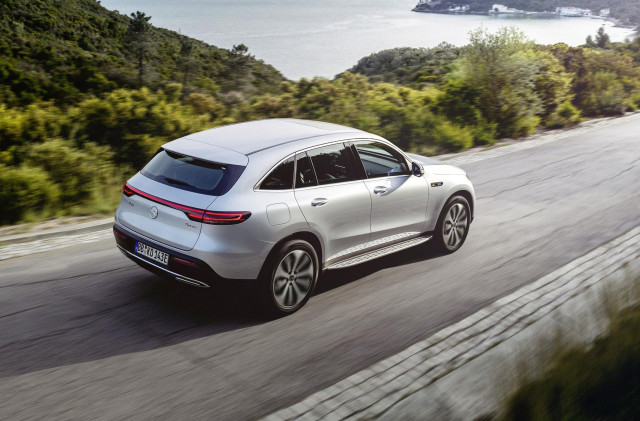
2020 Mercedes-Benz EQC Edition 1886
Mercedes-Benz's CEO-apparent Ola Källenius laid out a plan Monday, just after the Norway launch of its EQC electric SUV, that outlines the development of an entire "carbon-neutral" passenger-car fleet.
Källenius, currently the head of product development at Mercedes, has been named future Chairman of the Board of management of Daimler, the parent company of Mercedes-Benz starting later this year.
Part of the plan, called Vision 2039, calls to make half the company's models plug in by 2030—either plug-in hybrids or all-electric vehicles.
READ THIS: First Mercedes-Benz EQC rolls off assembly line in Germany
According to a transcript of his speech, Källenius said, "Let’s be clear what this means for us: a fundamental transformation of our company within less than three product cycles. That’s not much time when you consider that fossil fuels have dominated our business since the invention of the car by Carl Benz and Gottlieb Daimler some 130 years ago. But as a company founded by engineers, we believe technology can also help to engineer a better future."
He laid out plans to electrify the company's vans, trucks, and buses as well as its cars, and said the Mercedes is focusing first on building better electric cars, by bringing "EV performance up and costs down," he said.
Källenius also doubled-down on Daimler's commitment to developing hydrogen fuel-cell vehicles. "There’s also room and need to continue to work on other solutions," he said, "for example, the fuel cell or eFuels…. Today, no one knows for sure which drivetrain mix will best serve our customers’ needs 20 years from now. That’s why we encourage policy makers to pave the way for tech neutrality: Let’s fix the target, but not the means to achieve it."
He noted that in addition to electric buses, the company will also build city buses with fuel cells.
READ MORE: Mercedes joins forces with BMW to build an electric ecosystem
Källenius pointed to the company's car-sharing efforts such as Car2Go as a means to help customers reduce their carbon footprint, and said the company will be making new efforts to encourage its customers who buy EVs to charge them using renewable energy. The company launched an effort in March, in conjunction with BMW's Reach Now, to provide clean power to chargers, and smart home chargers, similar programs at Tesla and Volkswagen.
Of course, electric cars are only as carbon-neutral as the factories that build them. The company plans to convert all of its European factories to renewable energy by 2022, starting with an extension of its main plant in Sindelfingen, Germany, and including the factory in Bremen that builds the EQC and the Kamenz factory in Saxony where the EQC's battery is built.
By 2039, the year that gives the plan its name, the company intends to propagate the changes throughout its worldwide factories as well as its suppliers, using incentives as motivation.